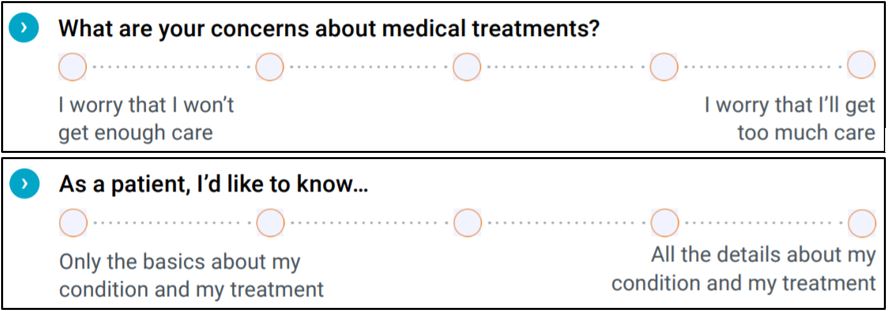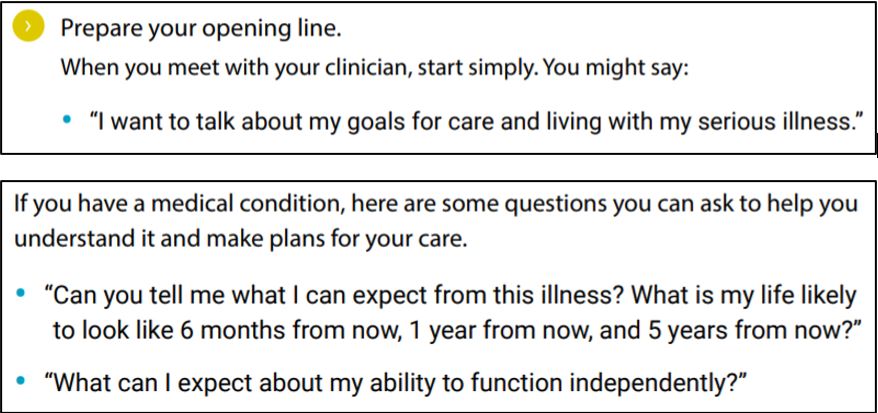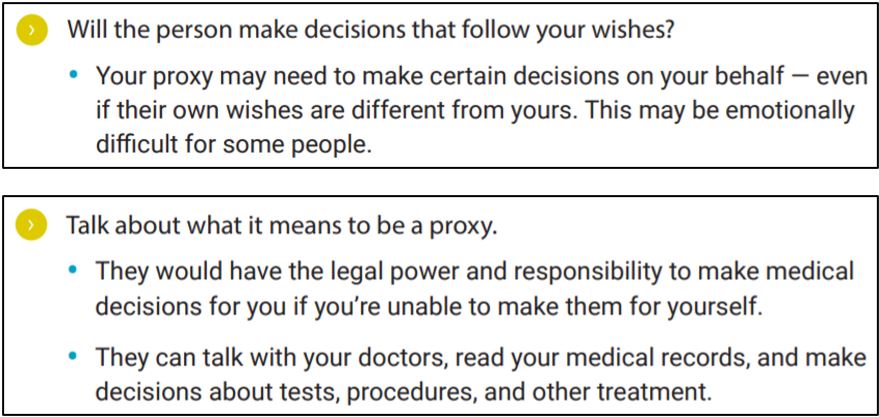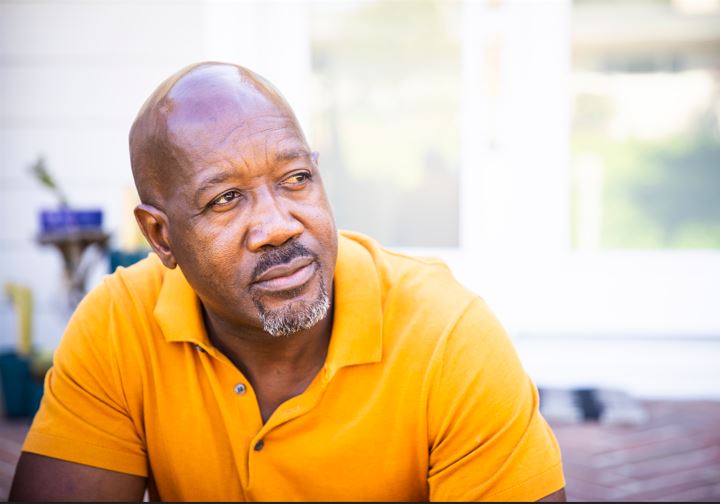We’re sorry to hear the news. As you go forward, please take care and know that The Conversation Project will be here as a resource for you and those who support you.
We can’t plan for everything. But we can think about what is most important — in our life, and in our health care — and talk about it with those who matter most.
To make that easier, we’ll share some ideas here that can be helpful when you have a serious illness, and some suggestions for how to talk with people you care about. First, we want to make two important things clear:
- This is a list of ideas, not a to-do list. You can use it as a reference. It includes three main ideas: 1) how to think and talk about what’s important, 2) talking with your health care team, and 3) choosing a health care proxy. It also has some general tips for having the conversation, including how to begin. You do NOT need to do everything on the list. Please pick the parts you find most helpful.
- You can decide how much you want to share. It’s up to you who you want to talk to about the specifics of your illness. You can ask your supporters to honor your wishes and to share (or not share) information about your health and decisions with others.
Three ideas to consider:
1) If you want to think and talk about the care that’s right for you…
Take a look at the What Matters to Me Workbook. This workbook can help you think about what is most important to you and come up with a plan to talk with your health care team. It can also help you plan for how you want to talk about your illness with others. For example, you’ll see questions like these:

Remember, you don’t need to figure out everything in one conversation. You can continue to talk over time.
(There is also a specialized guide that you may want to look through with a caregiver if you are diagnosed with Alzheimer’s or another form of dementia.)
2) If you would like help with conversations you will have with your health care team:
Look at the Talking with a Health Care Team guide. For either you or your proxy, this guide has tips on how to talk with a health care team about goals for care and next steps. It also has guidance for what to do if two different members of the team have different opinions about the best plan. Here’s a look inside:

3) If you could use guidance on picking someone to make health care decisions for you if needed…
Try the Choosing a Health Care Proxy guide. A health care proxy is the one person who speaks on your behalf if you can’t make your own health care decisions. (Sometimes a proxy is also known as a health care agent, power of attorney for health care, or surrogate decision-maker.) If you are unable to speak due to an accident or illness, your proxy would advocate for you. This guide talks about what a proxy does, who to pick, tips for having a conversation with that person, and steps for how to legally document your choice. Here are some examples:

Here are some people you can consider:
- Parent
- Spouse/partner
- Adult child (at least 18 years old)
- Sibling
- Cousin
- Friend
- Trusted neighbor
- Member of a faith community
If you do not have immediate family to turn to for support with concerns like health care, and you would like ideas for who you might ask to be a proxy and other kinds of support, take a look at this post with tips for solo agers.
(Once you pick a proxy, you might want to share with them this guide for being a health care proxy.)
Here are a few ways you might bring up these ideas with people you care about.
Parts of the conversation will depend on your relationship with the person you are talking to and the role they might play in supporting you. Please make your own changes and say what feels best for your situation. Here are some ideas:
- “I recently heard about The Conversation Project, and they have some free resources to help people with similar diagnoses think and talk about the kind of care they want to receive. I’d like to talk to you about it.”
- “I love you. I want you to be able to focus fully on our time together, rather than on health care decisions that may cause you stress. Can I share a few things with you now while I have the energy?”
- “I need your help with something.”
- “When it comes to talking about illness, we usually _______, and now I’m thinking _______.”
For example: “I know we don’t really talk about this stuff in our family, but I’m concerned you’ll be caught off guard if you’re ever asked to step in on my behalf.”
- I was thinking about what happened to _______, and it made me realize _______.”
For example: You might talk about someone else you know with a serious illness, or someone in a movie or book, and how their experience made you want to talk about what’s important to you.
- “Will you help me think about my future?”
There are many ways of communicating. If having a face-to-face conversation feels challenging, you might find it easier to start by writing an email, leaving a voice message, or even making a short video.
If you don’t have the energy or interest to have long conversations, that’s okay. You might try saying a few things about what matters most to you and whether you have any concerns about the type of care you might receive. Start there and see how it goes.
Remember that your emotions may change. Sometimes you might feel fine, sometimes not, and all of those feelings are okay.
Other kinds of support
Resources from The Conversation Project are focused on health care decisions. You may also want to have conversations with people about:
- Whether you want visitors and how you want to approach that
- Relationships you want to focus on
- What support the people around you may need for themselves (read some ideas about this here)
- Household support (meals; pet, home, or garden care; etc)
- Transportation or company for appointments
- Costs of care or other insurance/financial issues
It’s very common that your wants and needs may change over time, so keep lines of communication open so people can support you. This is about you and your feelings, wishes, and needs. Let us know in the comments what resources or forms of support have been important to you.
Want to keep connected to The Conversation Project? Sign-up for our newsletter(s), follow us on social media (Twitter, Facebook, Instagram, YouTube) download our conversation starter resources and feel free to reach us at ConversationProject@ihi.org.


This is EXCELLENT!!! As a pastor, I’m always looking for well-written information to support my congregants. Thank you for this thorough, yet succinct article!